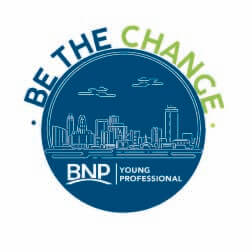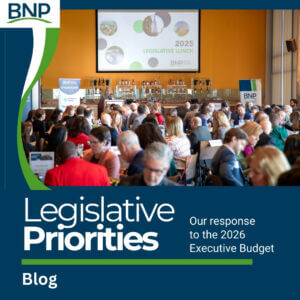6.15.21 BNP Advocacy Alert – 2021 NYS Legislative Session in Review
Blog Categories
June 15, 2021

BNP Earns Numerous Advocacy Wins
As the 2021 state legislative session comes to a close, the BNP is proud of the many advocacy wins it earned this year. The BNP, on behalf of its members who employ over a quarter million people in the region, remains in frequent contact with lawmakers about legislation that would impact our regional economy. This year, the BNP was successful in its advocacy on:
- Single Payer Healthcare (S. 5474/A. 6058). The New York Health Act would impose a single-payer healthcare system in New York State. The BNP opposed this legislation because it would raise healthcare costs and taxes, eliminate hundreds of thousands of jobs, and reduce the quality of care that New Yorkers receive. The BNP organized numerous memos, fact sheets, and events to educate lawmakers on this bill. The bill was not brought to a vote this year.
- Workplace Safety Regulations (S. 1034/A. 2681). The NY HERO Act created new, heavy-handed regulations on every private employer in the state. The BNP opposed this legislation because its goals can be achieved through less burdensome means. Although the legislation passed, the BNP’s advocacy resulted in amendments that made the legislation significantly less burdensome than the original legislation would have been. The BNP is currently working with the Department of Labor during the rulemaking process to limit the burden of associated regulations. Register for the BNP’s upcoming webinar on the HERO Act here.
- Gas and Carbon Taxes (S. 4264/A. 6967). The Climate and Community Investment Act would tax gasoline at an estimated 55 cents per gallon. Additionally, the Act would impose emissions-based carbon taxes, which would stifle our state’s economy and our manufacturing sector in particular. The BNP opposed this bill, and it did not become law this year.
- Recycling Program Financing (S. 1185). The Extended Producer Responsibility Act would force businesses to finance the cost of recycling any packaging material they use. This bill would drive manufacturers out of New York State and add significant costs onto NY consumers. The BNP opposed this bill, and the Legislature decided against advancing it this year.
- Employee Liens (S. 2762/A. 766). The “SWEAT” bill would create an “employee lien,” which employees can secure with an unproven wage and hour claim. This bill would cause significant financial harm to employers while denying them the right to due process. The BNP joined others in the business community in unified opposition to this bill and also organized a grassroots outreach campaign with our members. The Legislature ultimately did not bring the bill to a vote.
- Small Business Liaisons (S. 33/A. 3456). This bill will create a “small business liaison” position within the Departments of Agriculture & Markets, Environmental Conservation, Labor, Transportation, and Taxation & Finance. The BNP supported this legislation because it would simplify interactions between employers and the state. This bill passed both houses and is awaiting Governor Cuomo’s signature.
- Universal Rent Control (S. 3082/A. 5573). Known as the “Good Cause Eviction” bill, this legislation would make lawful evictions nearly impossible and establish a universal rent control model. The BNP opposed this legislation because it would reduce the stock of available housing, put many landlords out of business, and disincentivize housing improvement projects. This bill did not advance in committee.
- COVID as Occupational Disease (S. 1241/A. 6117). Under this legislation, COVID-19 would be classified as an “occupational disease” for worker’s compensation purposes. This bill would raise employers’ worker’s compensation premiums and bankrupt the state’s worker’s compensation fund. The BNP advocated against this bill, and it did not advance in committee.
- Increased Utility Regulations (S. 5117/A. 7412). This bill would govern broadband and VoIP services as public utilities. Doing so would unnecessarily increase the costs of these services and discourage needed investments in New York State. The BNP opposed this legislation and it did not advance in committee.
- Arrear Cancellation (S. 6275). This bill would require utility companies to forgive arrears accrued during the pandemic. The state would pay for 50% of the arrear value, and the company would be forced to absorb the other 50% of the cost. The BNP opposed this legislation because of the financial devastation it would cause to utility providers, who should not be forced to give their product away for free. This bill did not advance in committee.
For more about our 2021 Advocacy priorities, download our 2021 Advocacy Agenda Here
Related Posts
Empowering Young Professionals to step into advocacy
How does business advocacy actually work? And why should young professionals take interest?
Those were the driving questions behind Be The Change, a high-energy informational event hosted by the Buffalo Niagara Partnership’s Young Professionals (YP) group. Held at The Establishment, this members-only session gave attendees a behind-the-scenes look at how business advocacy shapes the regional economy, and how emerging leaders can play a role in that impact.
CEOs Speak: A cautious rise in optimism
At our recent CEOs Speak event—the only forum in Buffalo Niagara showcasing the results from the annual Upstate New York Business Leader Survey—local leaders delivered a powerful message: optimism is cautiously rising, but government intervention remains a persistent obstacle to regional economic growth.
Legislative priorities: BNP’s reaction to the Executive Budget
On February 14, we set the stage for critical discussions about the future of New York State’s economy by convening regional business leaders and policymakers, along with BNP members, at the 1970 Club in KeyBank Center for our Legislative Luncheon.
2025 Advocacy Agenda: Shaping the future
On Jan 9, our signature Government Affairs event unveiled the strategies and priorities that will guide our work this year with policymakers.




